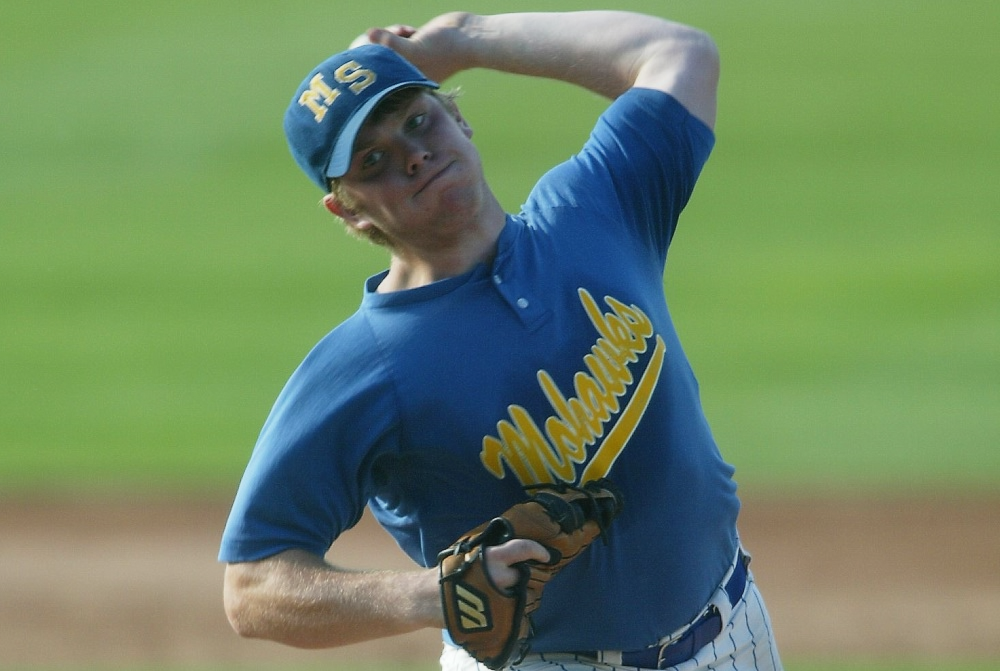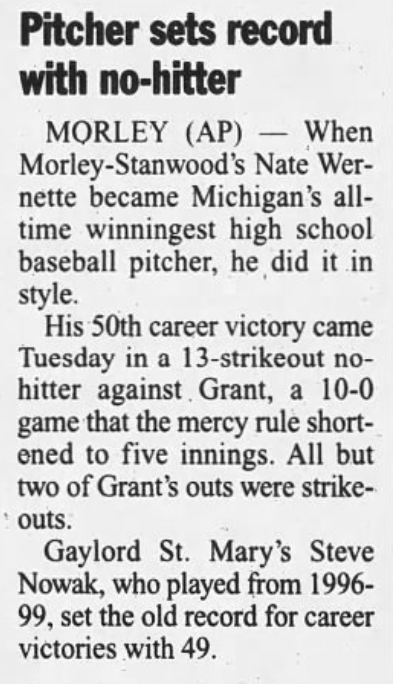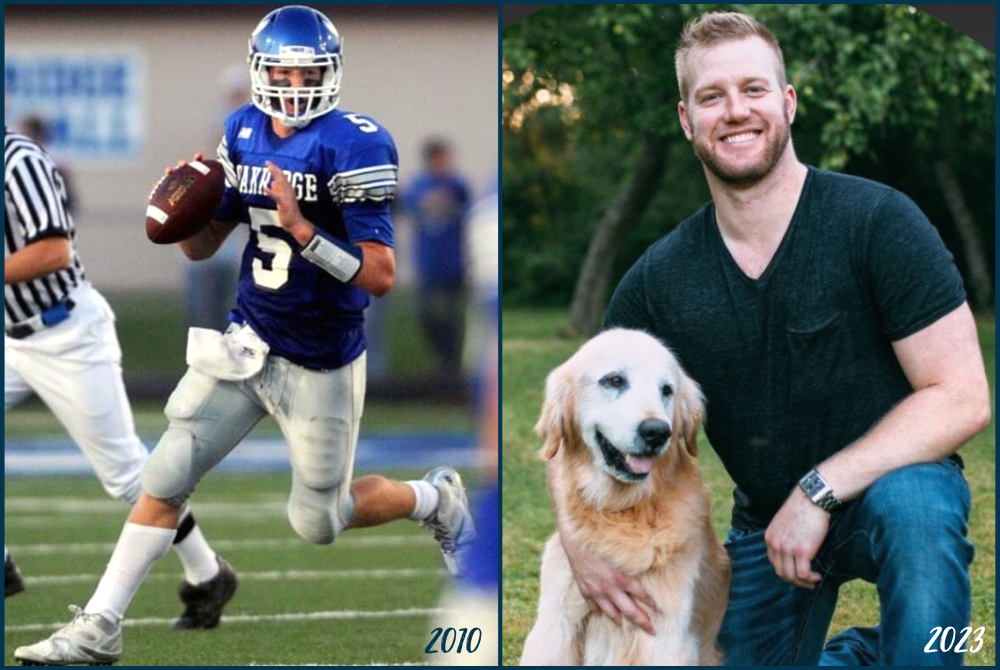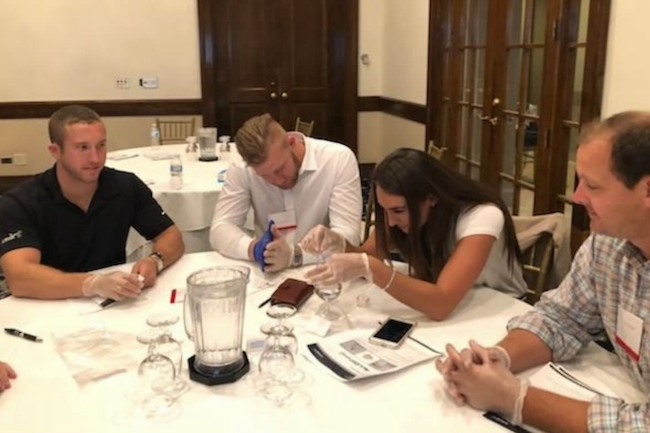
Decades Later, Wernette's Wondrous 2003 Remains Nearly Unchallenged
By
Steve Vedder
Special for MHSAA.com
April 24, 2023
Nate Wernette knew his final spring at Morley Stanwood had been special, but he had no idea just how historic it was until a strange visitor showed up at the family home near Stanwood just weeks after the baseball season ended.
The man, completely unknown to the family, produced a number of framed newspaper clippings and several pages of well-documented statistical research on Wernette's recently completed senior season at Morley Stanwood. The numbers showed that Wernette, a pitcher whose skill set fell somewhere between being a hard thrower and crafty left-hander, had accomplished even more than suspected at first glance.
In fact, the research showed that Wernette's senior year arguably was the single greatest pitching season in the history of Michigan high school baseball.
"We never had any idea," said Wernette on the eve of the 20th anniversary of that historic season in 2003.
Wernette was vaguely aware that his 20 pitching wins had broken the state record of 19 wins set by Brandon LaTour of Blissfield in 1992. The pair remain among only four pitchers in state history with at least 17 wins in a single season.
But as the man's research pointed out, that feat was just the tip of the iceberg. The 20 wins pushed Wernette's career total to 56, a state record that remains seven better than Homer's Josh Collmenter's eventual total of 49 from 2001-04. What Wernette also didn't realize was his 272 season strikeouts smashed the previous record of 215 by Southgate Aquinas’ Dan Horvath from 1998 and would outlast a challenge of 223 by Collmenter in 2004, and that Wernette’s average of 15.2 strikeouts per game was at that time second (and now fourth) all-time in state history. Wernette finished his career with 583 whiffs, second in state history.
He also tossed four no-hitters that season, second on the all-time list. Three of those no-hitters, in fact, came in consecutive dominant starts from May 6-10.
While Wernette was pitching himself into the Michigan high school record book, National Federation of State High School Associations (NFHS) research shows where Wernette's numbers stand nationally. It turns out that only 10 pitchers in the country's history have won more than 20 games in a season. The all-time mark is 25 by Randolph Slaters of Mooreville High School in Missouri in 1985. Wernette’s 272 strikeouts is fourth all-time, with Salters also holding that record at 336. The 56 career wins is sixth all-time, with Terry Heiderscheit of Lansing Kee High School in Iowa holding the record of 69 from 1975-78.
Wernette admits it's probably best that he was unaware of the records at the time. His focus was on being the only senior on a young 10-player Morley Stanwood team that many suspected would be lucky to break .500 in 2003. But behind Wernette's sensational season, Morley Stanwood finished 41-3, with Wernette suffering his only defeat 3-1 to Blissfield in the Division 3 championship game.
"I was kind of glad I didn't know. Who knows what would have been in the back of my mind if I knew I was that close (to the records)," he said. "I never thought that much about it. I didn't know about the strikeout record, and I never looked at my (won-loss) record until someone mentioned that I was close to 50 and that I could break the state record."
Wernette remembers starting about 17 games that season as at least a couple of the wins came in relief. The success also didn't exactly come out of the blue as Wernette went 7-5 as a promising freshman, then put together 14-3 and 15-4 seasons as a sophomore and junior, respectively. The 15 wins remain tied for 10th all-time in state history.
Wernette's catcher his final season was sophomore Drew Thompson, who remembers Wernette as having a fastball that touched 90 mph at best. He never threw a curveball until making the high school team and really didn't master it until his last season and a half for Morley Stanwood. But Wernette, an all-conference football linebacker, had a relentless competitive streak, Thompson recalled.
 "There was his velocity and the way he threw balls that tailed away from batters," Thompson said. "A lot of high school hitters never saw balls that would move away like that. But he was a gamer who just wanted the ball in his hand. If he got into trouble, he wanted a strikeout and he had the stuff to do it.
"There was his velocity and the way he threw balls that tailed away from batters," Thompson said. "A lot of high school hitters never saw balls that would move away like that. But he was a gamer who just wanted the ball in his hand. If he got into trouble, he wanted a strikeout and he had the stuff to do it.
"Everything fit together for him that year. He had confidence we would win whether we were down 1-0 or 2-1 or we were up. I remember him always being relaxed."
Wernette agrees everything indeed did fall into place that season. One of four Mohawks pitchers who could throw at least 80 mph, Wernette's place in the rotation included starting twice during the week while occasionally relieving in a weekend tournament. By the time the team was around 16 games into the season, Wernette realized something special was happening. The team played well in the usually strong Big Rapids Tournament, where the Mohawks swept Remus Chippewa Hills and Big Rapids. Morley Stanwood split a key doubleheader with Howard City Tri County, and suddenly Wernette and a painfully young Morley Stanwood club that virtually had returned little else than its No.1 pitcher was catching fire.
Wernette's 20th win came in a 3-2 decision over Rudyard in a Quarterfinal at Gaylord. Because rain on Tuesday had pushed the game back a day to Wednesday, Wernette was unable to start the team's Semifinal on Friday. But even without Wernette, the team's No. 3 hitter and first baseman when he wasn't on the mound, Morley Stanwood beat a 35-4 Goodrich team 4-3 in the Semifinal, paving the way for Wernette to pitch the Final. But Morley Stanwood made a couple key errors in the title game, and Blissfield pitcher Jake Recker – who had only a modest 4-4 record heading into the day – was excellent in a 3-1 win. The championship was part of three Finals titles over four years for Blissfield.
Wernette said his reflections on his heavy pitching load that season haven't changed in 20 years. He would take the ball whenever coach Ron Ford asked him.
"I never told him I couldn't pitch," Wernette said. "My arm never bothered me. I'd ice it after a game, and I never had an arm issue. Looking back now I know I threw more than a lot of high school pitchers, but I was all for it. I wanted the ball every chance I could get it."
While Wernette never suffered a sore arm during four years in high school, his pitching career ended five months after graduation. After attending a Detroit Tigers tryout in Grand Rapids, Wernette was advised he needed a year in college. So he shuffled off to Muskegon Community College, where during the opening weeks of fall ball, Wernette hurt his shoulder during a long toss exercise. While medical evaluations have made great strides in the last 20 years, Wernette said the numbness he felt probably meant a torn rotator cuff. He never tried pitching again.
"I probably should have stuck with it, and that's the biggest thing with me because baseball was so special," he said. "I took the game seriously, but the rest of it – like school – I wish I would have put more into it.
Wernette's spark for pitching is reflected in his two young daughters, Brooklynn, 11, and Jaycee, 8. Both are travel softball pitchers. Wernette said the family has a pitching machine set up to hone their talent.
"They're definitely into it," he said.
The records that Wernette set are probably untouchable as high schools have instituted tight mandates on the number of pitches that can be thrown over a certain number of days. For instance, the top pitchers on last year's 16 MHSAA semifinalists averaged 10.6 starts and 57.5 innings pitched. Wernette threw 125 innings as a senior.
Wernette heartily agrees there should be definite pitch limits on youngsters whose arms are not fully developed.
"I definitely see it as a good thing," he said. "Back then you never heard much about Tommy John surgeries of rotator cuffs. I never learned about that stuff until after school. I never had any concerns; I just wanted the ball every chance I could get it."
As for Wernette's remarkable season, he spends little time thinking about the achievements unless someone mentions them. But it's hardly comparable to the Bruce Springsteen "Glory Days" song of yesterday's greatness.
"Somebody will bring it up, and I have a lot of good memories. But I wish I would have done some things differently like paying more attention to school and applying myself. There was too much of just trying to get by," he said.
"But it was an honor to accomplish what I did. I'll always think that."
PHOTOS (Top) Morley Stanwood’s Nate Wernette makes his move toward the plate during the 2003 Division 3 Final against Blissfield. (Middle) Wernette’s record-setting win made the statewide news wire, appearing in various newspapers including as this clip in the St. Joseph Herald-Palladium.

Oakridge 3-Sport Star Potts Applying Lessons to 'Second Chapter' in Sales
By
Tom Kendra
Special for MHSAA.com
July 20, 2023
Jamie Potts put a major strain on his feet and ankles for many years.

Potts was constantly twisting and contorting in cleats and sneakers as a three-sport standout at Muskegon Oakridge and later as a rare two-sport star at Grand Valley State University, where he is still listed in the school’s football and baseball record books.
So it’s fitting that the 30-yeaar-old Potts is now helping to heal feet and ankles as a medical device salesman for Stryker.
“It’s a very competitive, fast-paced job and lifestyle,” said Potts, who graduated from Oakridge in 2011.
“I am very thankful for that because there is a huge void there. When you put so much of your time and energy into it, transitioning out of competitive sports is difficult.”
Potts is the youngest of four boys, so he practically grew up in the bleachers at Oakridge. By the time he got to high school, he fell effortlessly into the rhythm of football in the fall, basketball in the winter and baseball in the spring – all while maintaining a 4.1 GPA, good for fifth overall in his class.
Potts did everything on the football field at Oakridge, as a 6-foot-3, 200-pound dual-threat quarterback. As a senior, he rushed for 1,561 yards and 24 touchdowns and threw for 696 yards and 10 TDs – along with totaling 64 tackles and successfully booting 9-of-13 field goal attempts.
“He was a fantastic high school athlete and one of the best athletes to ever come out of Oakridge,” said former Eagles coach Jack Schugars, the all-time winningest high school coach in the Muskegon area who is now the special teams coordinator at Ferris State. “He was a tremendous leader and the epitome of a role model for younger kids.”
Potts was a solid, if not spectacular, basketball player, known as a defensive specialist who wasn’t afraid to guard anybody.
Then in the spring, he was back to all-state status in baseball as an outfielder, batting .584 his senior year with six home runs, 38 RBIs and 34 stolen bases.
That meant it was decision time when it came to college – would it be football or baseball?
Potts received several Division I offers, including from Central Michigan University for football and Oakland University for baseball.
But it was Division II Grand Valley, particularly then-assistant coach Matt Yoches (now the director of football operations at Miami of Ohio) that floated the possibility of playing both sports – a very rare feat at the DII level.
Potts made the GVSU coaches look like geniuses. He was a four-year starter at tight end and receiver, finishing his career second all-time for the Lakers in TD receptions (35) and third in career receptions (169). In baseball, he finished with 241 career hits, the fifth-most in school history at the time.
“People told me that playing both in Division II wasn’t realistic,” said Potts, who now lives on the east side of the state in Fenton, with his 1-year-old daughter, Brooklyn. “But I wanted to give it a shot and I think I did all right with it. Growing up in Oakridge, my life was all about sports, so it prepared me.”
 Potts was drafted by the Texas Rangers shortly after his senior collegiate baseball season in 2015 and played that summer for Class A Spokane (Wash.), batting .217 with four home runs in 57 games. He missed training camp and the first two games of the 2015 football season, but returned to help the Lakers to the DII Semifinals his senior year.
Potts was drafted by the Texas Rangers shortly after his senior collegiate baseball season in 2015 and played that summer for Class A Spokane (Wash.), batting .217 with four home runs in 57 games. He missed training camp and the first two games of the 2015 football season, but returned to help the Lakers to the DII Semifinals his senior year.
He prepared to resume his baseball career and left in late February for the Rangers spring training complex in Surprise, Ariz., before announcing his retirement in March with a long and heartfelt Facebook post, which concluded:
“My best advice I can give is that you should always chase your dreams until your heart says it’s time to stop,” Potts wrote. “No matter how far out of reach you think it is or how old you are, you can do it with enough hard work and preparation.”
Potts, who completed his degree in allied health sciences with a minor in psychology during the Lakers’ 2015 football run, then had to shift gears and find his place in the “real world,” outside of competitive sports.
Potts said Oakridge, in addition to being a hard-working sports community, also did a mighty fine job preparing him and his three older brothers, sons of Tom and Kathy Potts, for life after athletics. Oldest brother Chris is an engineer, Andy works as a logistics manager and Aaron is an orthopedic surgeon.
It was actually Aaron who pointed him in the direction of medical device sales. He went through five interviews shortly after his retirement before landing his first job in the field at Arthrex in Grand Rapids, before moving on to Kalamazoo-headquartered Stryker last year.
“A big part of my job is being in the operating room with the surgeons and making sure that everything is working,” explained Potts, who is part of a six-member team which covers much of eastern Michigan. “It’s very intense, very much like the feel of a close game. No doubt all of those years of sports help me every day.”
But Potts could not leave sports behind completely after his baseball retirement.
He was back in Muskegon in the spring of 2016 and attended a Muskegon Ironmen indoor football game. He spoke with team owner TJ Williams, who Potts used to watch playing for Oakridge as a kid, and a few weeks later, he was in an Ironmen uniform.
Potts played two years with the Ironmen as a receiver, linebacker and kicker.
“It was a lot of fun, really, getting to play in front of fans in Muskegon again,” said Potts. “The worst part was the walls. I’ve never experienced getting tackled into walls before and, I tell you, that takes some getting used to.”
More recently, Potts helped out last month as a coach at Schugars’ kicking camp at Oakridge, getting him back on the turf at Russell Erickson Stadium, where the field is now known as Jack Schugars Field.
“I’m happy to be a role model for kids,” said Potts. “You learn so many life lessons from playing sports. It really gets you ready for the second chapter of life.”
2023 Made In Michigan
July 18: Frankfort Hoops Staff Bolstered by Past Stars Giving Back in Banktson, Kreski - Read
July 12: Championship Memories, High School Tennis' Impact Stick with Hackett Pair - Read
July 6: Brother Rice Finals Hero Aiming to Ace Family Life, Financial World - Read
July 5: Lapeer West 4-Time Finals Winner Set to Build Champions at Oklahoma - Read
PHOTOS (Top) Jamie Potts runs the offense for Muskegon Oakridge as a senior in 2010, and now. (Middle) Potts, second from left, is advancing in his career in medical device sales. (Photos courtesy of Jamie Potts.)

